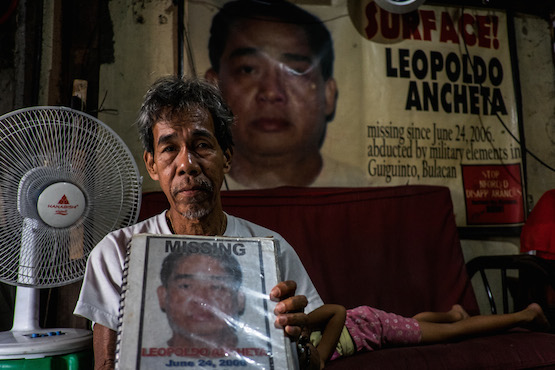All Souls' Day brings tears to kin of missing Filipinos
Most Filipinos visit cemeteries to honor their dear departed on All Souls' Day, but not 65-year-old Romeo Ancheta.
Nov 01, 2017

By Mark Saludes
Most Filipinos visit cemeteries to honor their dear departed on All Souls' Day, but not 65-year-old Romeo Ancheta.
Instead of lighting a candle and placing flowers on the grave of his loved one, the brother of a missing labor leader joined other families of victims of enforced disappearances at a protest rally.
"It is a dilemma we face every year. Do we light a candle, offer flowers, or say our prayers? We don't even have a body to bury," said Romeo.
Romeo has already given up on believing that he will still see his brother alive. He said he doesn't want to cling to false hopes that his older brother, Leopoldo, will reappear after disappearing 11 years ago.
Leopoldo went missing on June 24, 2006, in the town of Guiguinto, in Bulacan province.
Romeo suspects the military abducted his brother, a leader of the rebel National Democratic Front of the Philippines that has been negotiating a peace deal with the government to end almost five decades of conflict.
"He became an activist when he was in high school, before the martial law years," said Romeo of his brother.
Leopoldo established a group called the Makabayan Anak ng Obrero, or Nationalist Children of Workers, in the urban poor district of Tondo in Manila.
When former dictator Ferdinand Marcos declared martial law in 1972, Leopoldo went into hiding. He only surfaced for a few years in the early 1980s before going underground again.
After the 1986 uprising that ousted Marcos, Leopoldo resurfaced as one of the leaders of the National Democratic Front of the Philippines until his disappearance.
'Desaparecidos'
Human rights group Karapatan has recorded 1,856 cases of involuntary disappearances since 1970.
Most of those who went missing were activists, human rights workers, journalists, and critics of the government.
A 27-year-old college professor, Charlie del Rosario, who went missing in March 1971 was the first recorded desaparecido in the country.
During the Marcos dictatorship, 759 enforced disappearances were recorded, including that of Redemptorist priest Rosaleo Romano, who went missing in 1985.
After the fall of Marcos in 1986, the human rights situation did not change.
Vigilante groups that served as auxiliary units of the military targeted suspected rebels, resulting in the enforced disappearance of 821 people up to 1995.
Cristina Palabay, secretary-general of rights group Karapatan, said abductions and enforced disappearances are "ancient barbaric practices" to terrorize the opposition.
She said "so-called democratic governments still use it as covert tool of state fascism" to silence critics and political oppositions.
Father Manuel Vicente Catral of Tuguegarao Archdiocese said abductions aim to punish those who are left behind not the one who goes missing.
"It is a cruel but cowardly act to instill fear and discourage resistance," said the priest, adding that the hard part is whether to consider the missing person dead or alive.
"A manifestation of death is the absence of life in a human body. But if there is no body, how can we determine if there is absence of life," said Father Catral.
The military denied the involvement of soldiers in the disappearance of Leopoldo. Up to this day, there are no clues or leads as to his whereabouts or the identity of his abductors.
Romeo said he might not find out what really happened, but said he is willing to dig graves just to see his brother and light a candle and offer flowers on All Souls' Day.--ucanews.com







Total Comments:0